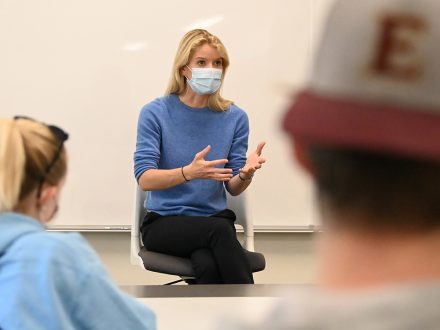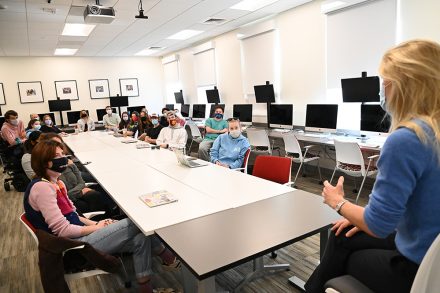During a mid-November visit, the award-winning foreign correspondent met with classes, student media and the campus community to share her reporting experiences in Afghanistan and the Middle East.

Jane Ferguson was in Kabul the day the Taliban took over Afghanistan, just after the collapse of Afghan President Ashraf Ghani’s government. Ferguson, a foreign correspondent for “PBS NewsHour,” stood alongside fellow journalists in the capital city, looking down from the top of a hotel roof as the transition of power unfolded. Nearly two months later, Ferguson visited with Elon University students, staff and faculty to present a Pulitzer Center-sponsored lecture, offering a glimpse into her recent reporting experiences and her career in journalism.

“I’ve covered vast amounts of conflicts and revolutions and coups, and various massive upheavals, but I’ve never ever heard anything like this story, here in Kabul,” said Ferguson to an audience in the McEwen screening room on Nov. 18.
Ferguson is a Polk, Emmy and DuPont award-winning foreign correspondent for “PBS NewsHour,” a contributor to The New Yorker, a 2020 McGraw professor of journalism at Princeton University and Pulitzer Center grantee. The Pulitzer Center, an organization that raises awareness about underreported global issues through direct support of journalists, partners with Elon University through its Campus Consortium efforts.
During her community lecture, titled “What’s Left Behind: Afghanistan after ‘Heartbreak of US Departure,” Ferguson said her goal while reporting in Afghanistan was to educate people on the larger context of what is happening in Afghanistan. That same objective led her to Elon. Ferguson said while many Afghan people have lived through Taliban rule and economic hardships before, the U.S. withdrawal and government collapse in August was different.
“This particular collapse, however, has been incredibly tough on the Afghan people,” Ferguson said. “Moving forward, what I really wanted to leave you with were some really important stories that we’ve been reporting on, but that you’re going to see more and more in the press and that really need a lot more press attention.”

Associate Professor Glenn Scott, who introduced Ferguson at her lecture, said he watches PBS nearly five days a week and was thrilled to introduce such a seasoned journalist to his students at Elon. Students in Scott’s class as well as other communications classes welcomed Ferguson into the classroom during her three-day visit.
“When we found out this year that there was a chance that that we could get that we could coax Jane to come to Elon, I was happy and I know so many other people were just so elated for this opportunity,” Scott said. “We made another great professional friend.”
In addition to her lecture, Ferguson spent time with student media leaders at Elon News Network, including Nyah Phengsitthy ’23. Phengsitthy is the managing editor of the student-run newspaper the Pendulum and a Pulitzer Center grantee herself. Phengsitthy plans to travel to Ghana in January to report on the impact of COVID-19 on orphanages in West Africa.
“Having Jane join us in the newsroom was definitely a memorable experience,” Phengsitthy said. “It was honestly just great to connect with her and learn more about her career as a journalist.”
With Elon’s partnership in the Pulitzer Center’s Campus Consortium network, Pulitzer Center staff and journalists visit campus twice a year. Additionally, students have the opportunity to work with the center on developing international reporting projects, which have been featured on the center’s website and can be disseminated through media partners.


